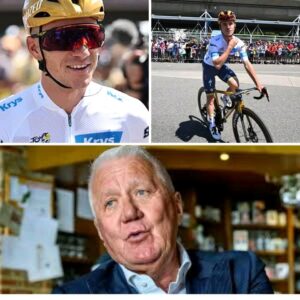
Former Soudal-Quick-Step boss Patrick Lefevere has shared new insights into the circumstances surrounding Remco Evenepoel’s withdrawal from the 2025 Tour de France, revealing that the Belgian champion simply lacked the necessary preparation, and that the decision to pull him from the race was both foreseen and justified.
Speaking to journalists at the start of Stage 15 in Muret, Lefevere stated bluntly that Evenepoel’s build-up to the Tour had been compromised from the start:
“Remco didn’t have a proper winter. His training camp after the Dauphiné was poor. We needed a miracle, but it didn’t happen.” (Domestique Cycling)
The Belgian had suffered a serious crash in December, forcing a hasty recovery and disrupted training schedule. Lefevere made it clear that this late preparation never allowed Evenepoel to achieve what’s required for the three-week Grand Tour grind. He added:
“I saw it coming for a few days already. Hautacam, Peyragudes – you could already tell he wasn’t doing well.” (Domestique Cycling)
“He Fought Bravely, Despite Being Broken”
Despite the disappointing outcome, Lefevere repeatedly praised Evenepoel’s determination. He highlighted the rider’s performance on Stage 13 to Hautacam, commending his effort to limit time losses even though many expected him to collapse:
“That’s what sticks with me most… everyone thought he would lose thirty minutes. But he really battled.” (Domestique Cycling)
This sentiment echoed earlier comments from team director Tom Steels, who described Evenepoel as “physically and mentally broken,” yet showed dignity and willpower in his performances during the Tour’s toughest stages. (IDLprocycling.com)
In a lighter moment, Lefevere also shared an anecdote from the team hotel after Evenepoel’s exit:
“Mechanics all arrived at once at a McDonald’s together with Remco. Absolutely right. He’s allowed to eat again now.”
“He didn’t say a single bad word about his teammates.” (Domestique Cycling)
The takeaway was clear—Evenepoel was allowed a moment of simple freedom and camaraderie after months of restrictive training.
Lefevere insisted that the withdrawal decision was made not just with hindsight, but out of medical prudence. Evenepoel and team doctors agreed that continuing would risk more than lost race time:
“Things hadn’t been right for three days in a row… you have to be cautious when a rider of his caliber and talent is getting dropped while there are still 80 riders in the group.” (Domestique Cycling, IDLprocycling.com)
He reinforced that tracking Evenepoel’s wellness—and prioritizing a long-term season plan—took precedence over short-term glory.
In Lefevere’s view, Evenepoel’s departure was not failure but a strategic reset. The grief around ending a Tour is understandable, but recognizing when to regroup is a hallmark of team leadership—and athletic maturity.
As Lefevere concluded:
“Remco handled himself with great dignity… if I speak for myself, I think you can expect more from teammates like Schachmann or Paret-Peintre—Remco didn’t let anyone down.” (Domestique Cycling)









